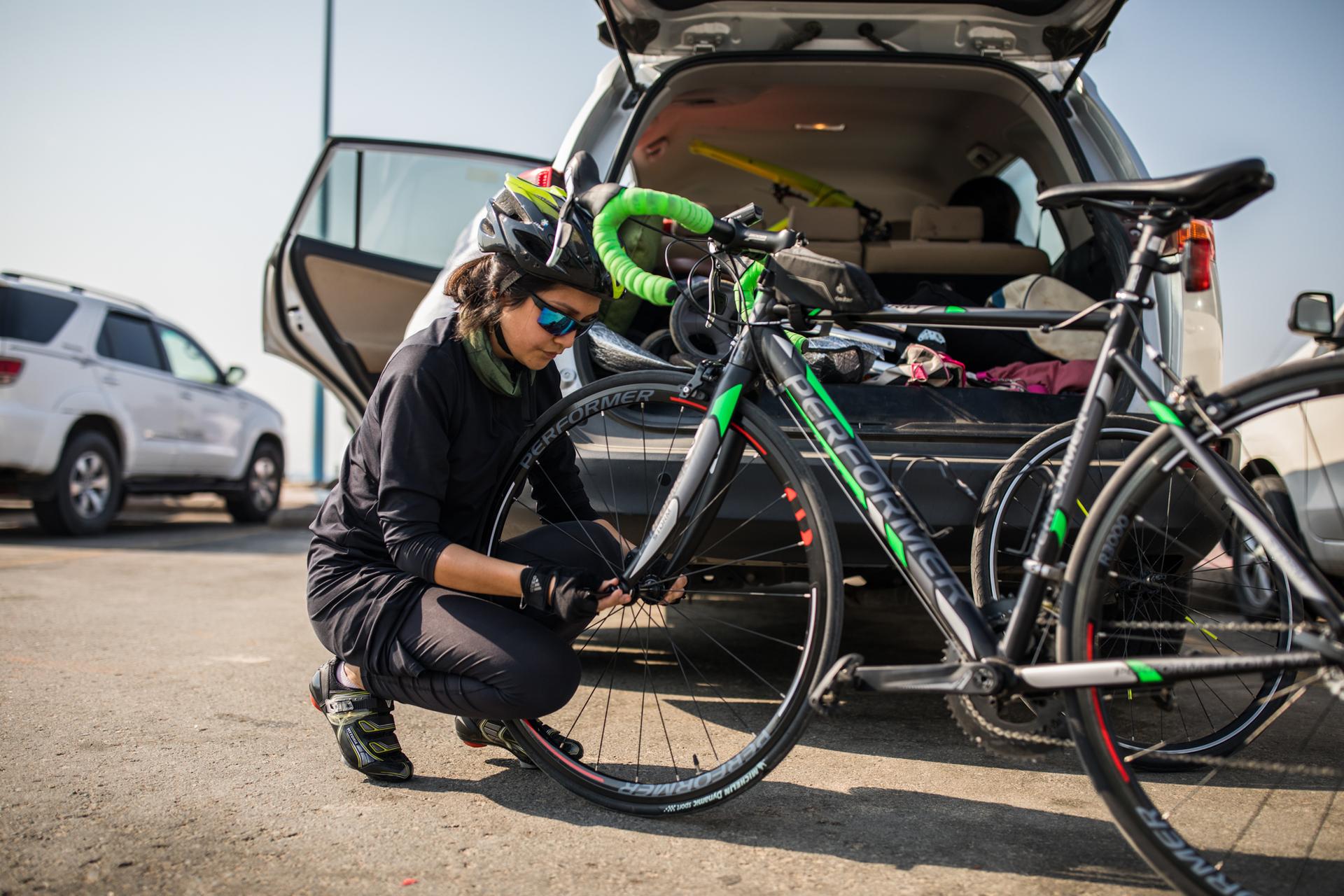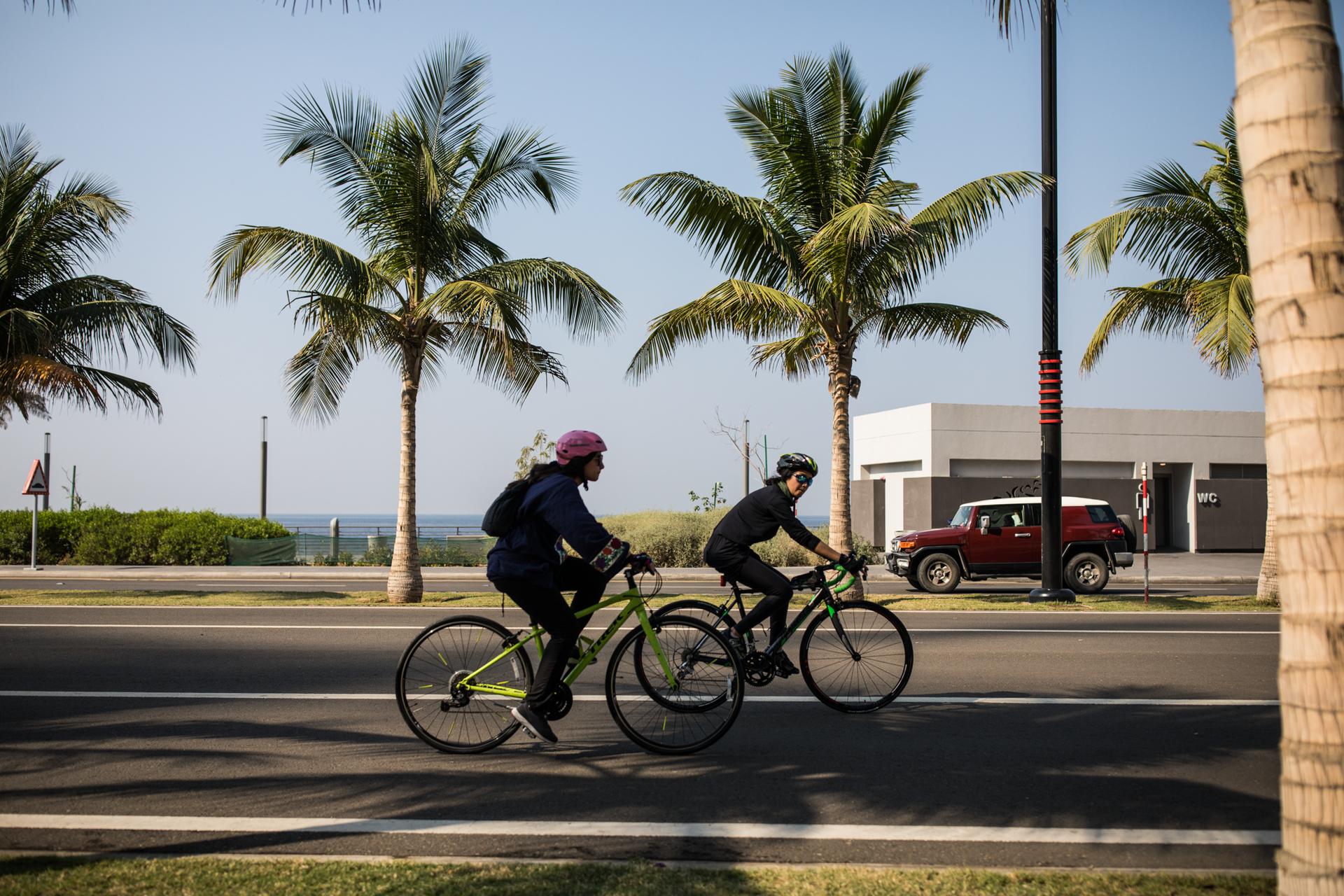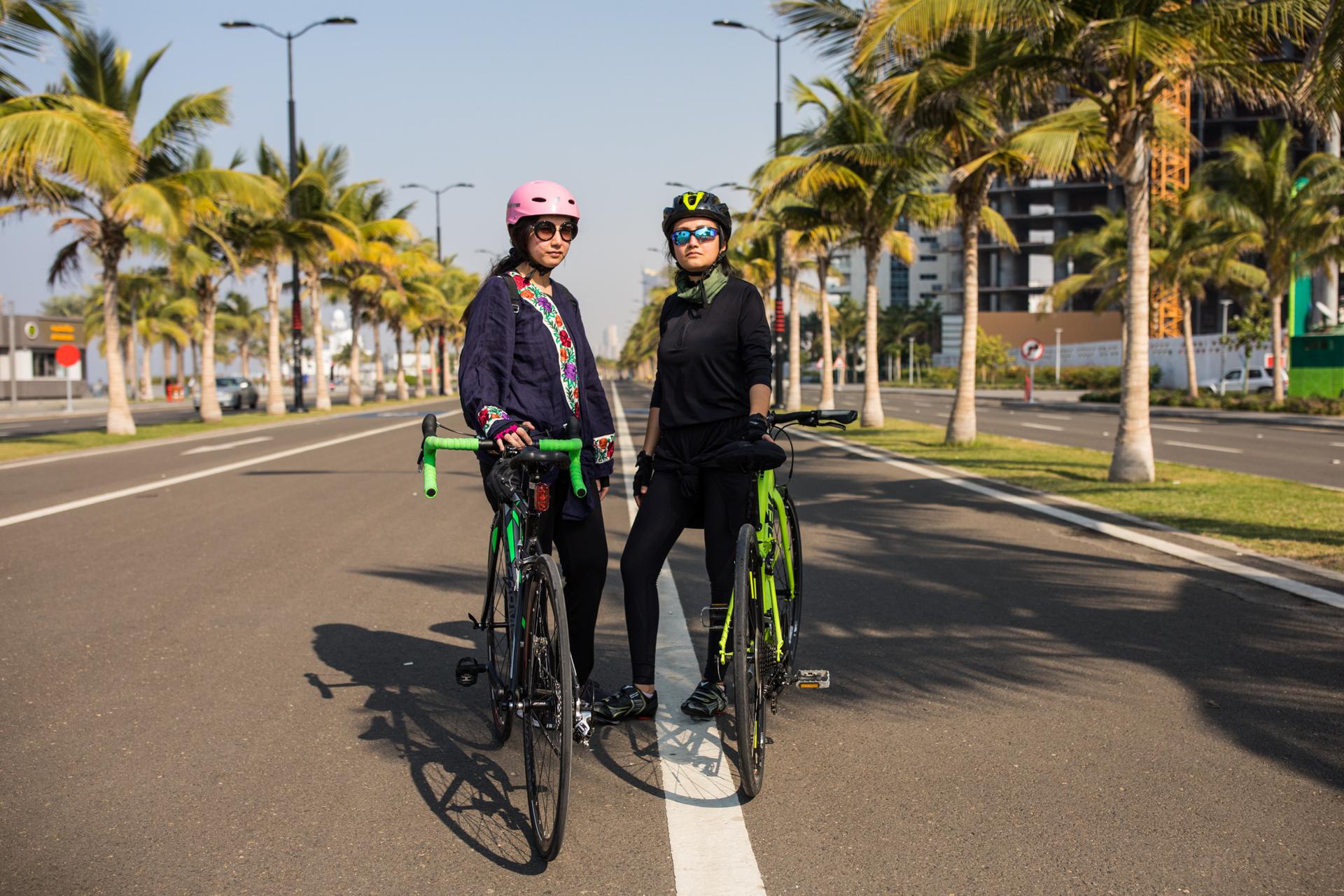Saudi cyclist says it takes a ‘brave heart’ to normalize the sport for women
Doaa Naeem (right) and her sister, Fatimah Naeem, ride their bikes along the Corniche in Jeddah, Saudi Arabia.
On a recent, Saturday morning, 32-year-old Doaa Naeem is bicycling near the famous Corniche Beach, in Jeddah, Saudi Arabia. It’s sunny, and the palm tree-lined bike path affords a nice view of the Red Sea. Naeem often comes here on the weekend — she prefers the early hours, when few people are out and about. Plus, the temperature is just right.
Today, her younger sister, Fatimah, 30, joins her. They have a regular routine: breakfast at a chic cafe nearby, then cycling and in Naeem’s case, home to feed her 1-year-old daughter. So, she cherishes this window of time — Naeem says she would take cycling any day, over, say, sitting idly someplace. She likes the workout and wants to get better at cycling, too.
“It’s really important to have a physical activity that you enjoy doing. It’s great to have something that you’re passionate about and at the same time, it’s an exercise for you. It can also be a bonding activity. The whole family can do it.”
“It’s really important to have a physical activity that you enjoy doing. It’s great to have something that you’re passionate about and at the same time, it’s an exercise for you. It can also be a bonding activity. The whole family can do it,” said Naeem, flushed and sweaty, and holding onto her lime-green, Trek Hybrid bike after a brisk loop on the trail.
Related: This Saudi tour guide wants you to come to his hometown, Jeddah
The bike path here is also one of the few safe places in Jeddah for women to cycle. In Saudi Arabia, women have only been allowed to cycle since 2013. Even with that freedom, they are still restricted to beaches and parks, must have a male guardian on hand and be dressed modestly.
Naeem has found a way to make it work for her — she wears the compulsory, loose robe that all women have to wear in public here, but she has cleverly customized hers for the ride. Her black abaya has a zipper, and she can tie the bottom into a knot, so the fabric doesn’t get caught in the wheel.
“And whenever I’m off my bike, I just make it into the regular size and go around,” she said, adjusting her outfit, her sporty helmet tucked under her arm.
When she first started riding her bike in public as an adult, though, Naeem made heads turn. “People started looking, staring, some people taking pictures, videos, turning around.” It made her uncomfortable, but she tried to ignore it. She was determined to normalize cycling for women. And she has noticed that something has changed over the past year or so — that is, Saudis have become more accepting of female cyclists.
In fact, Jeddah is more liberal than many other parts of the kingdom, but women cyclists here are still just a recent phenomenon, she says. Naeem recalls an incident from five years ago. She and a group of her friends were cycling in Jeddah when they were stopped by the police. Passersby had reported them to the authorities.
“But when the authorities came, they assured us that everything is OK,” she said. “[They said] there is nothing against the law when you are riding your bike. But I guess when you do anything for the first time — when people are not used to it — they say they don’t want it to become common among our girls.”
“For sports like cycling, you just need to have a brave heart for the first time,” she said. “You just have to […] do it so everyone will follow you and do the same.”
Related: Saudi women can drive. But gender equality isn’t yet ‘mainstream.’
Nowadays, on her rides, “Even the niqabi girls, the ones who are covering [their faces], they were clapping for us and waving, saying, ‘We want to come with you next time.’”

Today, there are more chances for Saudi women to cycle than ever before. In April 2018, the kingdom held a women’s cycling race in Jeddah on World Health Day. Also, in July 2018, four young women became the first Saudi female cycling team to join the Global Biking Initiative European tour, an annual, weeklong ride to raise money for charity. A number of cycling clubs geared toward women have sprung up, as well.
Cycling isn’t the only sport that Saudi women are taking up. They are slowly starting their own private gyms and pushing for participation in running, boxing and yoga, as just a few examples.
Princess Reema bint Bandar, the first female president of the Saudi Federation for Community Sports, has championed that, too — and this week, she was named the kingdom’s ambassador to the US. She is the first woman in the country to have such a role. Princess Reema has promoted women in sports and to have more active lifestyles. She also championed physical education for girls in schools and a gender-integrated team to the Special Olympics, CNN reports.
Those changes dovetail with Crown Prince Mohammed bin Salman al-Saud’s Vision 2030, his blueprint for the next decade. That includes getting women behind the wheel, and into the workforce, as well as opening up nontraditional jobs. It’s part of a larger plan to steer the country away from oil and modernize the kingdom.
In addition, MBS, as the crown prince is more commonly known, has clipped the wings of the morality police who used to cruise the streets ensuring women were dressed modestly and followed the kingdom’s strict rules. In addition to being able to bike, women are now allowed to wear abayas in various colors, not just black, and aren’t required to cover their hair.
Dana Ahmed, a researcher for Amnesty International in Beirut, points out that while MBS has relaxed some of the strict social rules — he has also been clamping down on the slightest form of dissent.
Last May, in the lead-up to the lifting of the driving ban for women, more than a dozen female activists who had pushed for the right were jailed. At least nine of them remain in prison. Families of the activists say they have been tortured and put in solitary confinement for long periods. The women activists have been accused of being involved in a foreign plot against the government.
“The arrest of academics and clerics and writers sends a message that reforms and constructive critique will only come from the government.”
“The arrest of academics and clerics and writers sends a message that reforms and constructive critique will only come from the government,” Ahmed said. Her organization has documented allegations of torture and abuse of the detainees by Saudi authorities. It has also called for their immediate release and an independent investigation into their cases.
For women, exercise is extremely limited
Historically, in Saudi Arabia, religious conservatives vilified exercise for women in public.
In 2012, when the kingdom sent its first-ever female athletes to the London Olympics, hard-liners called them prostitutes.
“Sports in the patriarchal society of Saudi Arabia has long been reserved as an activity for men. Even stadiums for watching sports prohibit females to be present,” according to an Arabian Business report from 2012.
Girls didn’t even have physical education classes in school until 2017.
“More ominously, a large section of the society flatly refuses the concept of sports and physical exercises for women. They lack awareness about the significance of sports and exercises for women,” Maali al-Abdely, the head of Jeddah United sports company, told Gulf News in 2017.
It’s no surprise that obesity is now a serious public health concern in Saudi Arabia, especially among women. Obesity rates have increased 34 percent in three years and are expected to surpass 77.6 percent by 2020, Dr. Azzam al-Qadi, an obesity specialist at Habeeb Hospital, told the Saudi Gazette, as reported in 2017.
In general, exercise options for Saudi women is extremely limited.
Yasmin al-Twaijri, an epidemiologist at the King Faisal Specialist Hospital and Research Center in Riyadh, said, “You would have to do it at home or join a gym or go to a mall and walk in the mall because it’s air-conditioned,” adding, “You see a lot of women in the shopping centers wearing sneakers under their abayas [loose robes that women wear in Saudi Arabia] and walking around in circles.”
Joining a gym, she says, is extremely expensive for middle-class families. Tawaijri says generations of Saudi women have grown up without exercise as part of their daily lifestyle. Including herself. So, when physical education finally became part of the school curriculum, Tawaijri’s feelings were bittersweet.
“I think my generation of women [middle-aged], in general, have mixed feelings because we’re so happy that it happened, but we’re kind of sad that it happened so late. And that we missed this opportunity when we were younger.”
“Actually not just me,” she said. “I think my generation of women [middle-aged], in general, have mixed feelings because we’re so happy that it happened, but we’re kind of sad that it happened so late. And that we missed this opportunity when we were younger.”
One of the problems facing women in the kingdom is, “We lead a very sedentary lifestyle. The weather is very hot which prevents people from going outside and walking or exercising. It’s very rare to see children playing outside in the playground. Another reason is that the cities were developed very quickly, and some neighborhoods have houses, but no sidewalks, which would then prevent people from walking outside.”
For Tawaijri, personally, it’s tough to find workarounds on her own. “I think a lot of it [physical activity] depends on the personality. Some people, like me, need to be in an organized system in order to be encouraged to move.”
It’s a serious issue. In her research, Tawaijri has looked at all of the risk factors that are causing breast cancer among women in Saudi Arabia. And it turned out that a lack of physical activity is the No. 1 cause of breast cancer. Among women who have breast cancer, 18 percent was caused simply because of that inertia.
Having a sedentary lifestyle isn’t the only culprit. Diets have changed, too.
“Uber Eats is a challenge for parents who are trying to control their kids’ eating behaviors,” Twaijri said. “And even before that, MacDonald’s here would deliver to the home.”
An all-too-familiar story
Twenty-year-old Abrar Arshaye who was visiting Jeddah from nearby Medina noticed Naeem, and her sister, biking around.
Arshaye loves the idea and wishes she could ride a bike, too. Arshaye, who tried cycling as a kid, never really learned how to ride in earnest.
Likewise, cycling still hasn’t caught on in her town, at least not for women. “Not in Medina,” she said. “Maybe you can see three women in a month — not so much.”

But for many Saudi women, stories like Arshaye’s are all too familiar. The 2012 movie, “Wadjda,” tackled the cycling issue — it’s about a Saudi girl who tries to raise money for a bicycle by signing up for a Quran competition. She longs to ride and race against a friend of hers — a boy. But her mother refuses to buy her a bike, since cycling isn’t considered acceptable for girls her age, heading into adolescence.
Naeem, too, recalls how her father taught her how to ride a bike when she was 8. Her excitement, however, was short-lived.
When she was a teenager, she had to let go of her bike: “Suddenly, the bikes disappeared.”
“My dad never mentioned directly that I can’t ride a bike. It’s only social norms that you automatically feel.”
“My dad never mentioned directly that I can’t ride a bike,” Naeem explained. “It’s only social norms that you automatically feel.”
As time wore on, Naeem got busy with school. Later, she got married. She and her husband traveled abroad and explored different cities, like Berlin and Vienna, on bikes. “And we said, ‘That’s so nice. Why can’t we have the same experience in Jeddah?’”
In 2014, the couple started a small riding group in Jeddah, and rode their bikes in the King Abdullah Economic City north of their home Jeddah. “It was a family cycling activity so the whole family can go together — females and males.”
“I was shocked to see that when we went as a group, a lot of the women in the group hadn’t even experienced cycling in childhood.”
“I was shocked to see that when we went as a group, a lot of the women in the group hadn’t even experienced cycling in childhood.” So, they were excited to learn how to ride, she says. They then split into two groups — professionals and beginners.
And Naeem’s persistence has paid off. A few months ago, she got a call from the Saudi Cycling Federation. They told her they want to form a Saudi cycling female team. “To have a female contribution in that field, it’s really new,” she said.
Naeem encourages her friends and family to join her on rides and helps them rent bikes and other equipment. Of course, newcomers are welcome. She imparts to them something she has learned along the way: “For sports like cycling, you just need to have a brave heart for the first time,” she said. “You just have to do it so everyone will follow you and do the same.”
